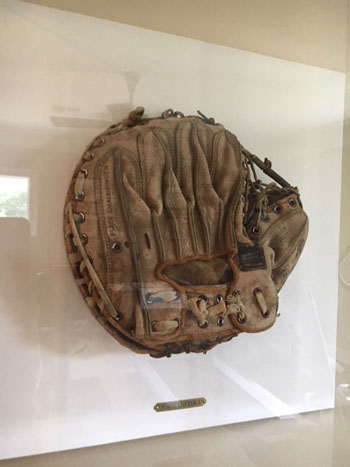
John McCloud loved to play baseball. He caught every game he could in and around Merit, Texas. As he grew older, arthritis slowed him down but never stopped him. His oldest grandchild, Mike Taylor developed the love. Today this mitt is mounted and encased for Mike. He hung it in front of the treadmill to help with motivation. John never needed any motivation.
We have been challenged for more than a week by extreme temperatures Mother Nature cast upon us. While large numbers of us have access to air-conditioning, others don’t. Then there are the persons who work out in this heat. My hat goes off to them.
But guess what, it was hot in Texas in the 1850s with drought conditions most of the time until the spring 1865. Then the rains came and drenched the whole state. So as long as records have been kept, summers in Texas have been uncomfortable.
However, there were some things our forefathers did each summer that we probably would pass on today. In the first half of the 19th century, people were under the influence of the Second Great Awakening. Groups from far and wide congregated in wooded areas for about a week of preaching, singing, repenting, and visiting. As they moved westward they brought the concept of Camp Meetings with them.
Since August is somewhat a slack time in farming, families loaded kids, bedding, food, tied to milk cow to the covered wagon and headed to a Camp Meeting. Social times for women and children were scarce but visiting was a high priority at the camp meeting. They listened to circuit preachers, sang Gospel songs, shared meals, and enjoyed a few days away from home. Usually the site of camp meeting was not on the best farmland, probably in a wooded area with a stream of water nearby. After a few days, they packed up to go home, back to chores and everyday routine. Everyone looked forward to the next summer.
Camp Meetings stopped during the Civil War, though soldiers on both sides were comforted at revivals. When the war was over, camp meetings regained their popularity until about the 1880s. It was then that preachers began to travel the countryside on horseback, on trains, and probably in wagons. Folks gathered in towns and villages to hear these preachers at Revivals. Until the 1950s, every small and medium size town had at least one revival each summer.
Where the Camp Meetings were non-denominational, particular churches sponsored revivals with everyone invited. Some were held outdoors under a brush arbor, while others gathered under tents or in churches.
Finally there were baseball games. As early as 1900, and probably much earlier, boys and young men played baseball games. Girls sometimes played. My husband’s grandfather John McCloud was a catcher on a team in Merit for years. One of my grandfathers and his brothers played baseball in Blecherville, Montague County, Texas. They were all drovers or cowboys, as we would say today. I have always wondered how they ran the bases with boots on.
Towns the size of Greenville had semi-pro teams. After World War II the Greenville team was the Majors, named for Truett Major, first pilot from Greenville killed in the war. I know of no one of a certain age that didn’t go to watch the Majors.
But suddenly, baseball and revivals died out. My friend John Mark Dempsey, once known as the Voice of the Greenville Lions, has a theory. Television and air-conditioning killed both baseball and revivals. It was so much nicer to sit under the air-conditioner and watch TV. Do you agree?
